This article has been reviewed according to Science X's editorial process and policies. Editors have highlighted the following attributes while ensuring the content's credibility:
fact-checked
reputable news agency
proofread
Just keep swimming: SoCal study shows sharks, humans can share ocean peacefully
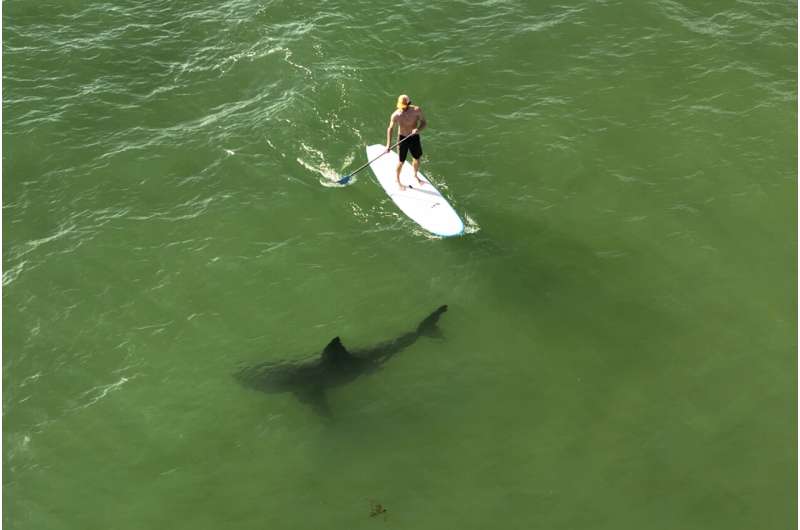
You're gonna need a bigger ... drone.
That's right, "Jaws" fans. Researchers at California State University, Long Beach-based Shark Lab used drones to study juvenile white sharks along the Southern California coastline and how close they swim to humans in the water.
Turns out, it's pretty close. Almost within the bite radius.
Still, it's safe. There were no reported shark bites in any of the 26 beaches surveyed between January 2019 and March 2021, according to the Shark Lab.
The juvenile white sharks mostly grouped together in two locations—in southern Santa Barbara County and central San Diego County—the researchers discovered through roughly 1,500 drone flights over the two years. Adult white sharks are generally solitary animals.
In those two spots, the juvenile sharks swam near humans on 97% of the days surveyed, the researchers wrote in a paper published Friday. The sharks often swam within 50 yards (45.72 meters) of the wave breaks—closest to surfers and stand-up paddle boarders.
"Most of the time water users didn't even know the sharks were there, but we could easily see them from the air," said Patrick Rex, a Cal State Long Beach graduate student who led the study.
-
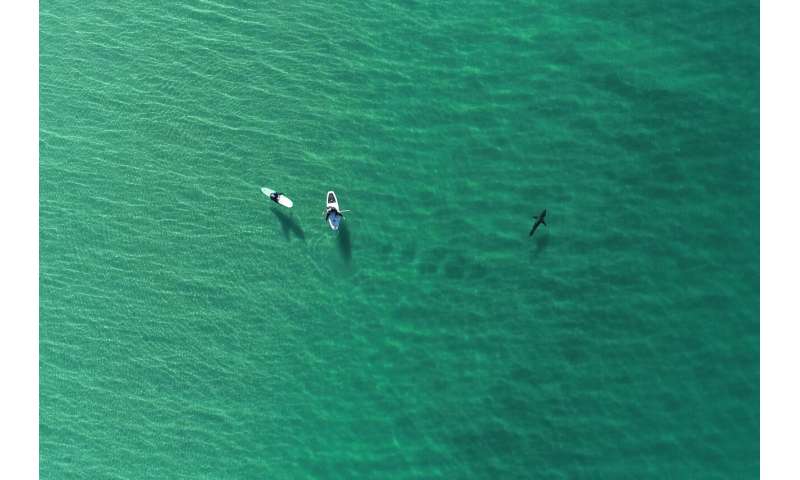
In this drone image provided by researchers with the Shark Lab at Cal State Long Beach, shows a juvenile white shark swimming along a couple of surfers on the Southern California coastline, May 31, 2023,. Researchers at California State University, Long Beach, used drones to study juvenile white sharks and how close they swim to humans in the water. There were no reported shark bites in any of the 26 beaches surveyed between January 2019 and March 2021. Credit: Patrick Rex/CSULB Shark Lab via AP -
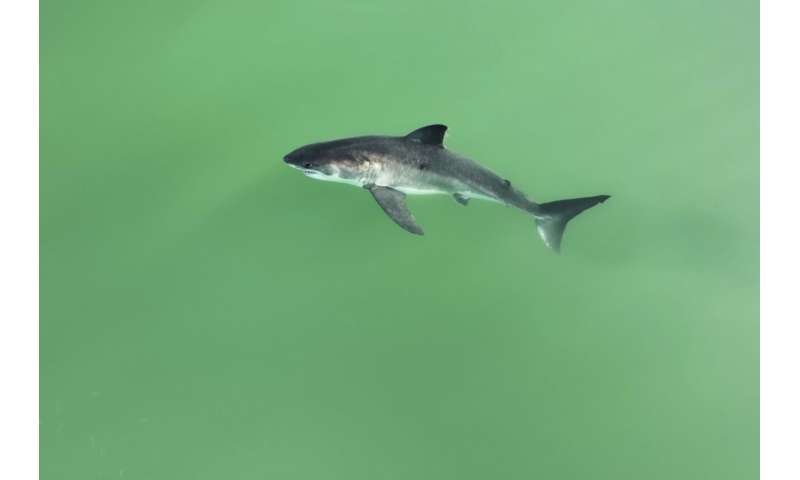
This drone image released by provided by researchers with the Shark Lab at Cal State Long Beach, shows a close view of a white shark swimming along the Southern California coastline, Feb. 9, 2022. Researchers at California State University, Long Beach, used drones to study juvenile white sharks and how close they swim to humans in the water. There were no reported shark bites in any of the 26 beaches surveyed between January 2019 and March 2021. Credit: Carlos Gauna/CSULB Shark Lab via AP -
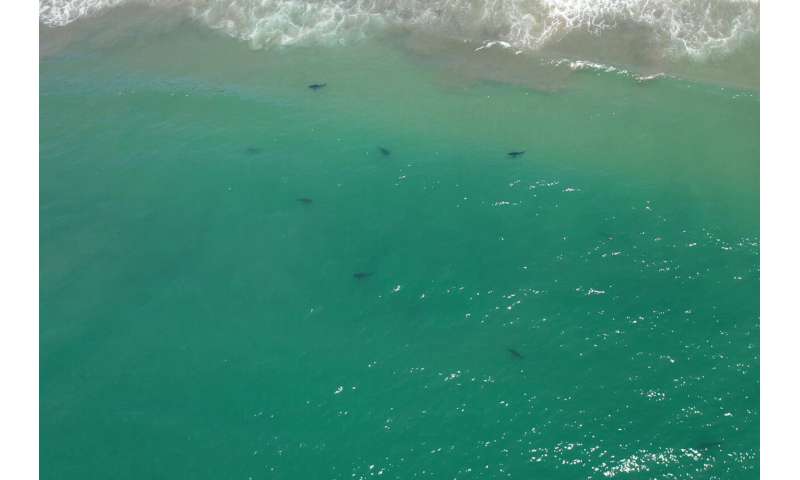
In this drone image provided by researchers with the Shark Lab at Cal State Long Beach, shows an aggregation of juvenile white sharks swimming along the Southern California coastline, May 31, 2023. Researchers at California State University, Long Beach, used drones to study juvenile white sharks and how close they swim to humans in the water. There were no reported shark bites in any of the 26 beaches surveyed between January 2019 and March 2021. Credit: Patrick Rex/CSULB Shark Lab via AP -
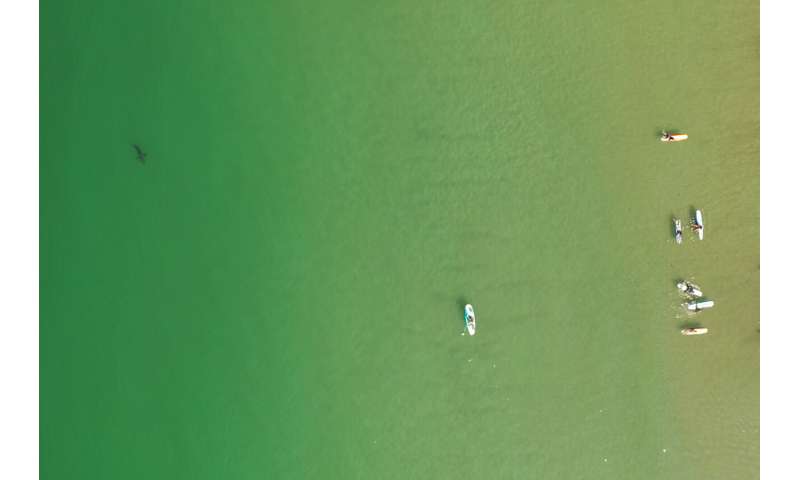
In this aerial image provided by researchers with the Shark Lab at Cal State Long Beach, shows an aggregation site of juvenile white sharks swimming along the Southern California coastline, Aug. 12, 2021. Researchers at California State University, Long Beach, used drones to study juvenile white sharks and how close they swim to humans in the water. There were no reported shark bites in any of the 26 beaches surveyed between Jan. 2019 and March 2021. Credit: Patrick Rex/CSULB Shark Lab via AP -
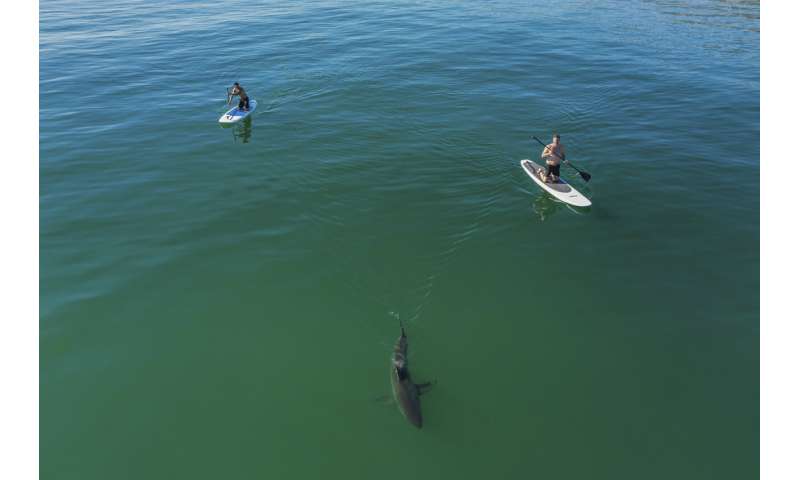
In this drone image provided by researchers with the Shark Lab at Cal State Long Beach, shows a juvenile white shark swimming close to kayaks on a long board along the Southern California coastline, Nov. 14, 2021. Researchers at CSULB Shark Lab, used drones to study juvenile white sharks and how close they swim to humans in the water. There were no reported shark bites in any of the 26 beaches surveyed between January 2019 and March 2021. Credit: Carlos Gauna/CSULB Shark Lab via AP -
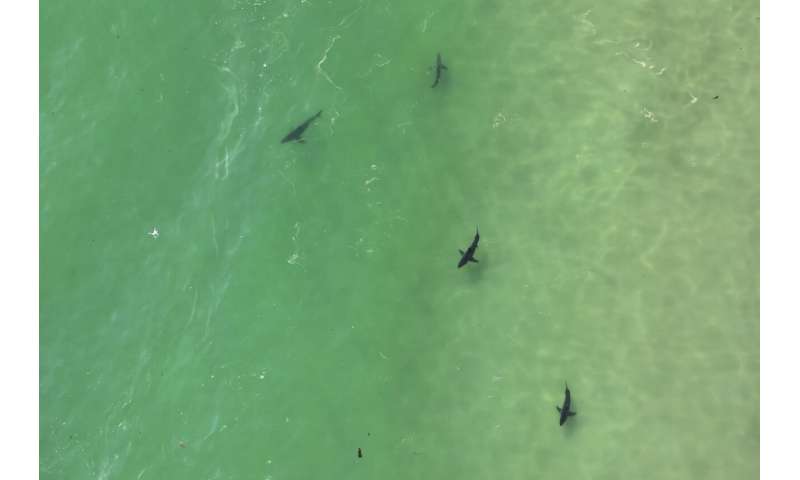
In this drone image provided by researchers with the Shark Lab at Cal State Long Beach, shows an aggregation of juvenile white sharks swimming along the Southern California coastline, May 30, 2023. Researchers at California State University, Long Beach, used drones to study juvenile white sharks and how close they swim to humans in the water. There were no reported shark bites in any of the 26 beaches surveyed between January 2019 and March 2021. Credit: Carlos Gauna/CSULB Shark Lab via AP -
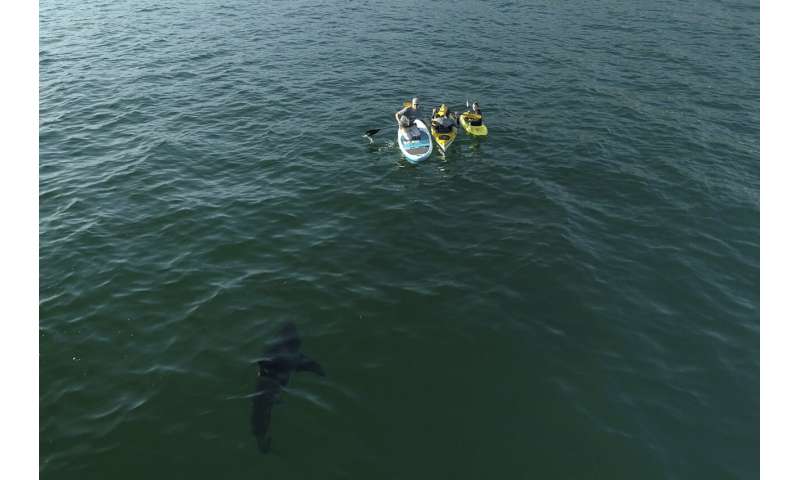
In this drone image provided by researchers with the Shark Lab at Cal State Long Beach, shows a white shark swimming close a group of kayakers along the Southern California coastline, Nov. 14, 2021. Researchers at CSULB Shark Lab, used drones to study juvenile white sharks and how close they swim to humans in the water. There were no reported shark bites in any of the 26 beaches surveyed between January 2019 and March 2021. Credit: Carlos Gauna/CSULB Shark Lab via AP -
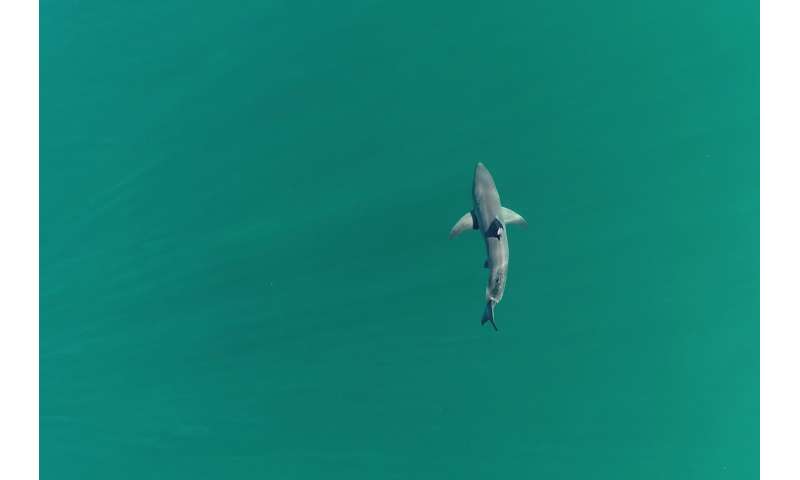
In this drone image provided by researchers with the Shark Lab at Cal State Long Beach, shows a white shark swimms along the Southern California coastline, May 31, 2023. Researchers at CSULB Shark Lab, used drones to study juvenile white sharks and how close they swim to humans in the water. There were no reported shark bites in any of the 26 beaches surveyed between January 2019 and March 2021. Credit: Patrick Rex/CSULB Shark Lab via AP
The researchers confirmed that surfers, swimmers and sharks can coexist peacefully but "we never expected to see so many encounters every day with no incidents" of bites, said Chris Lowe, a marine biology professor and the Shark Lab's director.
"It's not just about sharks, it's about people," Lowe said. "This study may change people's perception of the risk sharks pose to people that share the ocean with them."
So just keep swimming.
© 2023 The Associated Press. All rights reserved. This material may not be published, broadcast, rewritten or redistributed without permission.

















